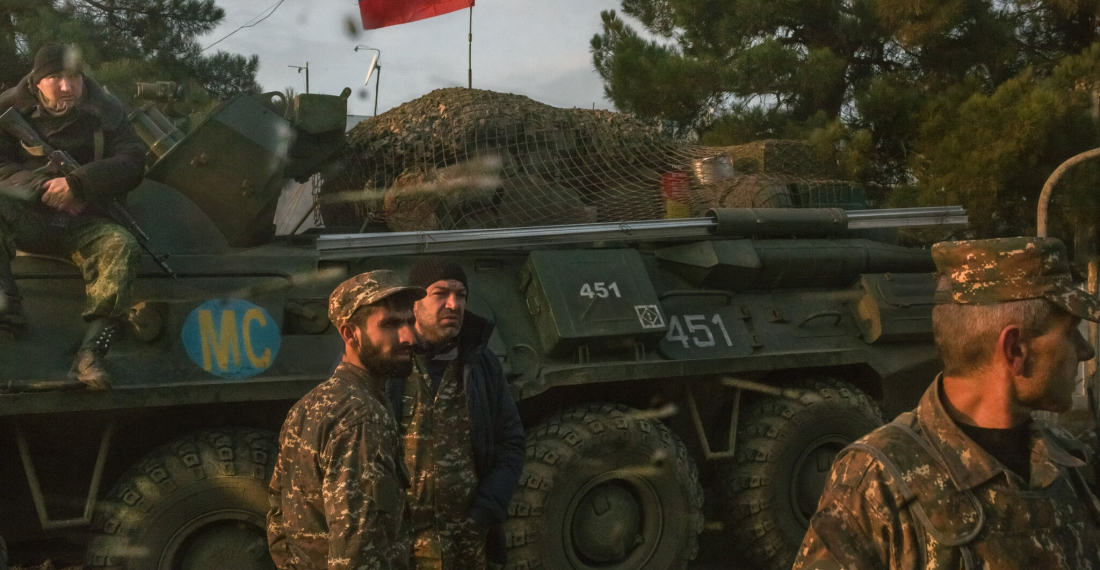The 10 November 2020 trilateral statement that ended the 44-day Karabakh War did not create any mechanism to discuss possible incidents along the new line of contact and prevent future ones, and there is still lack of clarity regarding the peacekeeping forces' mandate and their rules of engagement says Benyamin Poghosyan in this op-ed. An incident response mechanism with international participation can help present and address incidents and can contribute to the process for a lasting solution to the Karabakh problem, he argues.
The 2020 Karabakh war has significantly shifted regional geopolitics. Seven months have passed since the 10 November 2020 tripartite statement that ended the hostilities, but experts and pundits are still arguing on the war results. Among the most discussed issues is the role of Russia and Turkey in the region, the fate of the OSCE Minsk Group, the future of the Russian peacekeeping forces after November 2025, and the opening up of communications between Armenia and Azerbaijan.
Meanwhile, in parallel with this big, geopolitical picture, ordinary life continues in the unrecognised Artsakh (Nagorno-Karabakh) Republic. Much is unclear there too. The state institutions function – President, National Assembly, Government – but many issues are being solved through consultations with the leadership of the Russian peacekeeping forces. No significant violation of ceasefire has been registered, besides the early December 2020 clashes, when Azerbaijani troops took control over several villages of the Hadrut region. However, several incidents in recent weeks occurred when Azerbaijani troops opened fire towards Armenian towns and villages, targeting civilians working in the fields.
The 10 November 2020 statement did not create any mechanism to discuss possible incidents along the new line of contact and prevent future ones. There is a lack of clarity regarding the peacekeeping forces' mandate and their rules of engagement. According to information circulated in Armenian media and expert circles, Azerbaijan has not approved the peacekeeping forces mandate yet. Regardless of the reasons behind Baku's decision, the ambiguity on peacekeeping forces' mandate and rules of engagement may create additional flashpoints along the line of contact in the future.
Meanwhile, the continued differences in the assessments of the situation in Karabakh after 10 November 2020 add more uncertainty. Azerbaijan claims that the conflict has been solved and rejects any possibility to discuss the status of Nagorno Karabakh, either with Armenia or anyone else. Before the 2020 Karabakh war, Azerbaijan was reiterating its willingness to offer the highest level of autonomy to Karabakh within Azerbaijan, but after the 10 November 2020 statement, apparently Baku has no intention to come back to the issue of Karabakh's status.
The authorities of Armenia and unrecognised Artsakh (Nagorno-Karabakh) Republic claim that by starting the war on September 27, 2020, Azerbaijan violated one of the main principles of the decades-long negotiation process – non-use of force. According to this logic, the use of force will not bring lasting peace and stability into the region, and the only way to achieve that goal is to resume the negotiations under the auspices of the OSCE Minks Group co-chairs. The Co-chair countries – Russia, the US, and France – appear to agree with this logic. In their recent statements, they called on the sides to resume high-level political dialogue under the auspices of the Co-Chairs at the earliest opportunity to achieve a final, comprehensive, and sustainable settlement. However, it is unclear how Co-Chair states may force Azerbaijan to abandon its current approach and accept that Karabakh's final legal status has to be determined through the legally binding expression of will as was stipulated in basic principles put forward back in 2006.
Obviously, the negotiation process is in deadlock now, with no clear path forward. Azerbaijan may hope to wait until 2025 and demand the withdrawal of the Russian peacekeeping forces, which will inevitably result in the exodus of the 120,000 Armenians currently living in the non-recognised Artsakh (Nagorno-Karabakh) Republic. Armenians may hope that Russian troops will not leave in November 2025, and the current status quo may linger indefinitely. Regardless of how the reality will unfold, steps should be taken to solve the daily routine issues that exist along the new line of contact. The international community should not simply wait and see what will happen in November 2025. The population of the unrecognised Artsakh (Nagorno Karabakh) Republic has the inalienable right to live in a secure environment while big players are moving forward with their geopolitical ambitions.
In this context, a concrete measure to ease tensions can be the establishment of an incident prevention and response mechanism in Artsakh (Nagorno-Karabakh). The IPRM can provide an opportunity to discuss such issues as the identification of potential risks, the follow-up of incidents, and the exchange of information, as well as problems affecting the communities on a daily basis. Another option could be the establishment of a hotline to operate within the framework of this mechanism. The main goal of the hotline can be the rapid response to concrete and specific incidents. The representatives of the unrecognised Artsakh (Nagorno-Karabakh) Republic, Azerbaijan, and Russian peacekeeping forces should participate in the discussions within this mechanism.
Meanwhile, the representatives of the OSCE Minsk Group's two other Co-Chair states – the US and France – and the EU Special Representative for the South Caucasus and the crisis in Georgia should act as facilitators of the incident prevention and response mechanism, securing the involvement of the Minsk Group and the EU in the activities within the mechanism. Establishing the incident prevention and response mechanism in Artsakh (Nagorno-Karabakh) will be the first tangible step towards securing stability and may create the necessary environment for the relaunch of the negotiations on the settlement under the auspices of the OSCE Minsk Group Co-Chair countries.
source: This op-ed was prepared for KarabakhSpace.eu by Benyamin Poghosyan, Founder and Chairman of the Center for Political and Economic Strategic Studies in Yerevan.
photo: Russian and Armenian soldiers at a checkpoint in Nagorno-Karabakh (picture courtesy of New York Times)



